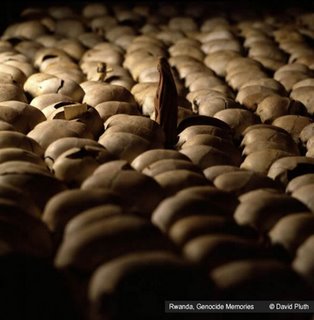 There has been a French parliamentary inquiry, which – predictably – cleared its own government. But now a former senior Rwandan diplomat has told a tribunal in his own country that France played an active role in Rwanda's 1994 genocide.
There has been a French parliamentary inquiry, which – predictably – cleared its own government. But now a former senior Rwandan diplomat has told a tribunal in his own country that France played an active role in Rwanda's 1994 genocide.The Rwandan tribunal is hearing from 25 survivors of the genocide, who claim to have witnessed French involvement and will rule on whether to file a suit at the International Court of Justice. The panel is headed by former Justice Minister Jean de Dieu Mucyo and its proceedings, which began in the Rwandan capital, Kigali, on Tuesday, are being broadcast live on local radio.
France has denied playing any role in the 100-day frenzy of killing in which 800,000 Tutsis and moderate Hutus died but Jacques Bihozagara, the former Rwandan ambassador to Paris, claims otherwise. He argues that the French were heavily involved at all stages, driven by concerns about their diminishing influence in Africa.
And, for a country in denial, it has also failed to express any regret. In fact, claims Bihozagara, French involvement continues to this day – its government has still not apprehended genocide suspects living in France. Furthermore, it is also alleged that French soldiers provided escape routes to militia escaping to the Democratic Republic of Congo after the massacres.
This was under the guise of a United Nations mandate known as Operation Turquoise, ostensibly to set up a protected zone. But French soldiers were actually deployed to protect the genocide perpetrators, allowing Hutu extremists to enter Tutsi camps and continue the slaughter even in the protected zone.
From other reports, we learn that French soldiers are accused of training and arming some of the Hutus that carried out the massacre, and some 50,000 people are reported to have been killed after French forces brought Tutsis out of hiding under the false pretext that they had secured the peace.
After hearing the testimony, the panel will have the next six months to determine its findings which, if the earlier testimony is any guide, should prove to be explosive.
Any such findings, however, will not be just of academic interest to the British government. As my colleague has remarked, France is a country which has yet to come to terms with its post-colonial legacy yet which, through the European Union common foreign and security policy, is binding Britain tighter and tighter into its sphere of interest.
Even now, we are still committed to further military integration driven largely by France, which raises the spectre of British troops in the not too distant future being deployed in pursuit of French foreign policy objectives.
 Given that the continuous and expanding threads of evidence point to France as a country that has, from Vietnam through Algeria and a succession of African colonies up to and including the Ivory Coast, exercised a wholly malign influence, we really do have to ask ourselves whether this is a country with which we can afford to be associated.
Given that the continuous and expanding threads of evidence point to France as a country that has, from Vietnam through Algeria and a succession of African colonies up to and including the Ivory Coast, exercised a wholly malign influence, we really do have to ask ourselves whether this is a country with which we can afford to be associated.For so long we have heard all manner of jibes and accusations against the United States but, if we are to choose between allies, the murderous history of the French would seem to make them a very poor second-best.
COMMENT THREAD
